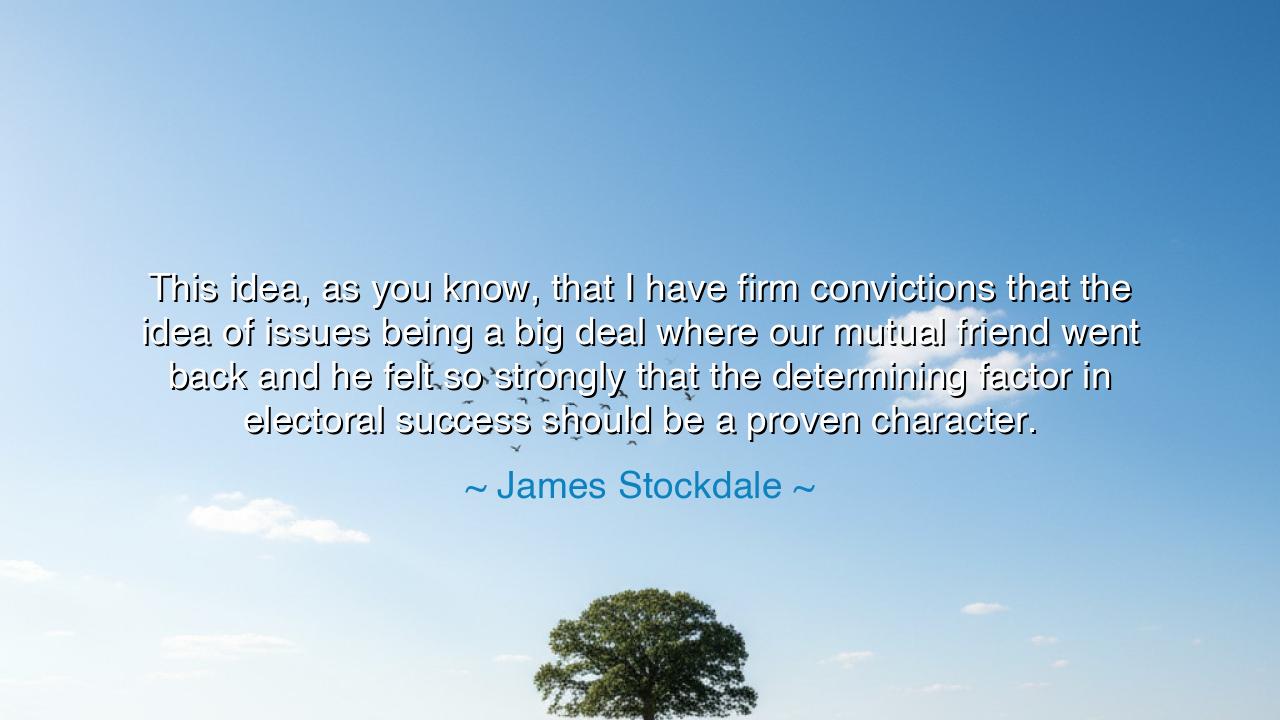
This idea, as you know, that I have firm convictions that the
This idea, as you know, that I have firm convictions that the idea of issues being a big deal where our mutual friend went back and he felt so strongly that the determining factor in electoral success should be a proven character.






Hear the solemn voice of James Stockdale, warrior, philosopher, and servant of his nation, who declared: “This idea, as you know, that I have firm convictions that the idea of issues being a big deal where our mutual friend went back and he felt so strongly that the determining factor in electoral success should be a proven character.” His words, though winding, carry the weight of a man who endured suffering, captivity, and the scrutiny of public life. He points us toward a timeless truth: that while policies and debates may shift like the winds, it is character—tested, proven, unshaken—that determines true leadership and lasting victory.
The ancients themselves taught this lesson. Aristotle spoke of virtue as the foundation of statesmanship, declaring that no man could govern well who could not govern himself. Policies may please for a season, promises may stir the masses, but only a leader with unshakable character can endure the storms of history. Stockdale, forged in the crucible of a prison camp in Vietnam, knew this truth not from theory but from fire. He had seen how men survive not by slogans, but by inner strength; not by rhetoric, but by integrity.
Consider the tale of Cincinnatus, the Roman farmer called from his plow to defend the republic. He wielded power only long enough to save his people, then returned humbly to his fields. His greatness did not lie in political issues or clever words, but in the proven character of selflessness, duty, and honor. His story lived on for centuries because his integrity outshone all temporary victories. Stockdale points us to this same measure: that true success, even in elections, must rest not upon shifting debates, but upon the immovable rock of virtue.
History also warns of the opposite. Leaders without proven character may win with words, but they fall with disgrace. Promises made without integrity turn to dust, and nations that exalt rhetoric over virtue are left broken. The rise and fall of many kings and rulers—be they emperors of Rome or tyrants of later ages—bear witness that without character, success is but an illusion, destined to collapse. Stockdale, who had endured seven years of captivity with courage and discipline, understood that no man can lead others if he has not first mastered himself.
His words also remind us that issues—though important—are not the deepest test. They are like garments, changing with time and circumstance. But character is the flesh and bone beneath, enduring through trial. A leader’s stance on issues may sway to meet the needs of the hour, but his character—honesty, courage, loyalty, resilience—remains the true compass by which his actions are judged. Stockdale calls us back to this eternal standard: do not ask only what a leader believes, but who a leader is.
The lesson is clear: in seeking success, whether in public life, private endeavors, or the quiet leadership of family and community, the foundation must always be character. Skills may impress, charm may persuade, but only proven virtue sustains trust. A house built on sand will fall, but a life built on integrity will stand, even when storms rage. Stockdale’s own life is the testimony: he endured torture, humiliation, and despair, yet remained unbroken because his soul was anchored in conviction.
Practical wisdom follows: do not neglect the cultivation of your character. Attend not only to your achievements, but to your honesty, your courage, and your compassion. When opportunities for leadership come, they will be decided not by cleverness, but by the trust you inspire. Test yourself in small things, so that when great trials come, your character will already be proven. Seek not the applause of the moment, but the quiet strength that endures.
So let the words of James Stockdale be remembered: the determining factor in success must be a proven character. This is not only counsel for elections, but for every arena of life. Children of tomorrow, heed this truth: achievements fade, arguments pass, but character—once forged in fire—becomes the eternal crown of the soul.






AAdministratorAdministrator
Welcome, honored guests. Please leave a comment, we will respond soon